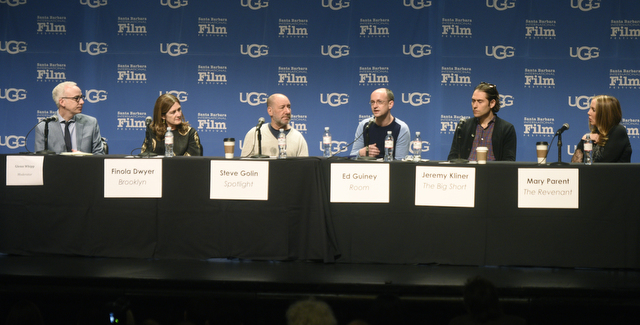SBIFF 2016: Producers Panel
All-Star Group Talks Money, Directors, and the Academy Awards

This year’s producer’s panel got hopping about halfway through the hour when moderator and L.A. Times film reviewer Glenn Whipp presented the group of Academy nominees with an essential cliché. “Is the word ‘no’ in your vocabulary?” Whipp asked the group, essentially resurrecting the old wheeze about moviemaking as a battle between producers (money) and directors (creativity.)
Mary Parent (The Revenant) insisted that her director Alejandro Inarritu had a strong point of view but was a “reasonable and logical guy,” even though she had just described the worldwide hunt that she had to conduct because he ran out of winter while filming The Revenant and had to move to South America to finish the job. Other respondents insisted that every director was different, just as each one of these movies was. Jeremy Kleiner (The Big Short) thought that an ensemble cast as big as his was — or as Steve Golin’s Spotlight — meant accumulating headaches related to casting and scheduling. Ed Guiney (Room) demurred, “All of us here know that any good film is one long conversation.” Ins and outs must be experienced together, the group said, and for films like The Revenant the conversation can take 10 years and two continents. “No one is doing this for money, I guarantee it,” said Kleiner.
Troubles with the Academy of Motion Pictures took them into slightly awkward conversational space, though the group decided that the racial problems Oscar was having were indicative of the whole industry and not just one body of popularity voting. The Oscar is just the end of a system of choices, the line of problems preventing diversity. But even in Ireland (Guiney) and New Zealand (Finola Dwyer, who produced Brooklyn), these issues have been openly debated for decades now. All agreed that the discussion now was good, even though it’s hard to imagine anyone taking up the anti-diversity end of that debate.
The audience was cheered by the panel’s embracing of the spirit of the Oscars. In an era of international filmmaking and big tent poles, said Kleiner, the Academy stands for great quality filmmaking. A nomination also increased the audience tenfold, said Dwyer.
Finally, why produce? “If actors get the glory and directors get the credit, what do producers get?” asked Whipp. A chance to make stories, they all said. But Kleiner, who made a message movie, was more specific: “It’s a great job. You can scramble people’s minds in a good way. That’s not rational, but it’s exciting.”



